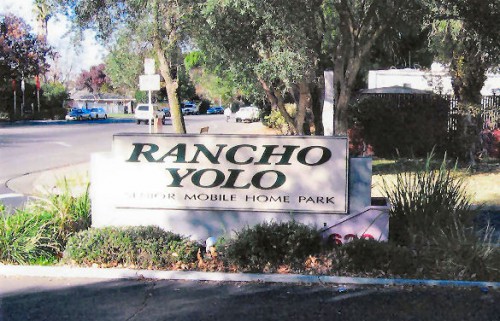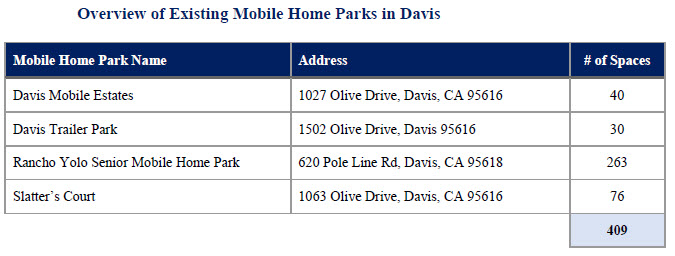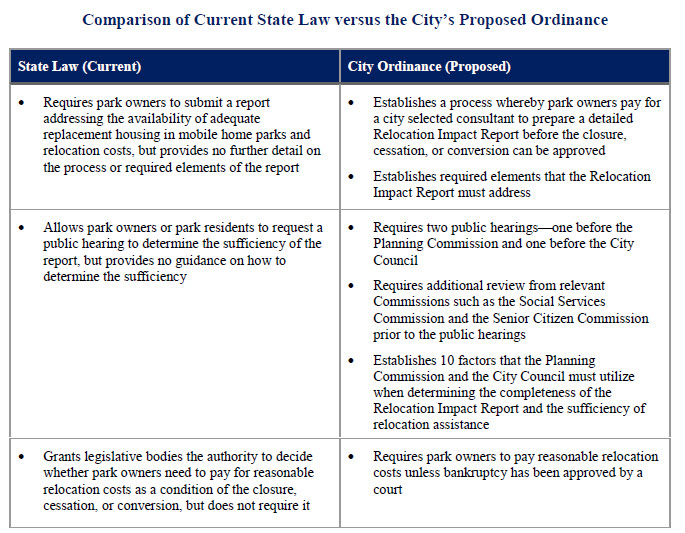
Back in April of 2017, when the Sterling Apartments discussion occurred, council grew concerned that residents of Rancho Yolo were vulnerable to development projects that could serve “as a catalyst for potential land use conversion.”
Staff notes: “Specifically, Council worried about how the construction of the Sterling apartment complex and the Chiles Ranch subdivision as well as the submittal of the Lincoln40 proposal would impact existing housing and redevelopment.”
At the same time, the council as well as members of the Board of Supervisors in the city-county two-by-two expressed concerns about “the inherent vulnerability of most mobile home residents, who, despite owning their mobile homes, reside on plots of land they do not own.”
Mobile homes were viewed by many as “affordable by design” and therefore they play “an integral role in the community’s overall housing stock.”
In an effect to address these concerns, “Council directed staff to research options for regulating mobile home park closures, cessations, and conversions.”
In July 2017, the staff presented findings to council and council asked staff to:
- Establish procedures and standards to govern the closure, cessation, or conversion of an existing mobile home park to another land use;
- Mitigate the impact of such closures, cessations, or conversions on displaced residents who may be required to relocate; and
- Encourage the preservation of affordable housing.
Staff emphasizes that no one is aware of any park owners who have the intention to close, cease or convert an existing mobile home park.

Staff notes that the proposed ordinance would only apply to parks within the incorporated city limits, however there was some discussion about the potential annexation of Davis Creek Mobile Home Park.

Staff warns, “As with any law, however, there are legal limits to such regulation. The City cannot wholly prohibit a park owner from closing or converting a park, or otherwise limiting the use of the property to such a degree that the regulation deprives the owners of the utility or value of the property.”
Staff has thus worked carefully to consider potential options and protections for mobile home park residents, while at the same time attempting to balance the interests of existing park owners.
The Social Services Commission reviewed the plan in May and voted 6-0 to support the following recommendations: name the commission as a second advisory body; route the ordinance through the  Senior Citizen Commission; inform residents of ensuing relocation impact earlier in the process; clarify what will happen if the City Council finds the relocation impact report to be incomplete or finds the relocation assistance to be insufficient; utilize a percentage rather than a number to determine representatives on a Residents’ Advisory Committee; define reasonable relocation assistance, taking into account individualized financial circumstances; explore the legality of a right of first refusal for residents to purchase units of a new development, explore zoning change as leverage and explore the legality of rezoning the three parks on Olive Drive to include a mobile home designation.”
Senior Citizen Commission; inform residents of ensuing relocation impact earlier in the process; clarify what will happen if the City Council finds the relocation impact report to be incomplete or finds the relocation assistance to be insufficient; utilize a percentage rather than a number to determine representatives on a Residents’ Advisory Committee; define reasonable relocation assistance, taking into account individualized financial circumstances; explore the legality of a right of first refusal for residents to purchase units of a new development, explore zoning change as leverage and explore the legality of rezoning the three parks on Olive Drive to include a mobile home designation.”
The staff will bring forward the following items for the council to consider in late summer or early fall when this item returns.
First is the idea of zoning protections. Staff writes that “of the four mobile home parks within City limits, only Rancho Yolo possesses an R-2-MH designation. Requiring park owners to seek approval for a zoning amendment prior to land use conversion if the planned use is not permitted or conditionally permitted, the designation provides an added layer of protection from closure or conversion.”
Second, stay in business incentives. Staff writes that “using a concept that originated in the City of San Jose, staff could explore instituting an “opt-in/stay-in-business” model. Staff learned of this proposed model while researching other jurisdictions’ mobile home conversion ordinances. The model offers park owners financial and/or streamlining incentives to make needed capital improvements in return for keeping the parks operating for a defined period of time.”
Third is limitations or other controls on future rent for park residents. Staff writes that “another option is developing an ordinance to impose limitations or other controls on future rent for park residents. Many cities have instituted mobile home rent control ordinances to protect residents from unreasonable rent increases, particularly when mobile home parks are repeatedly purchased and sold to new owners.”
Finally, seek the possibility of additional restrictions to protect existing levels of housing affordability and density. Staff writes that “given that the City’s existing affordable housing requirements and zoning controls would apply, this option involves a complex legal analysis examining the intersection of state mobile home law and affordable housing law.”
You can read the draft report here:Mobile Homes Draft Ordinance
—David M. Greenwald reporting







Davis… gotta’ have a draconian solution to a “maybe/what if/theoretical” problem… surprised, actually, that it isn’t more draconian… so, given that it could be worse, perhaps Davis should do this… a lesser of evils, as it were…
The city can always just buy the parks for ~$9 million/acre/~$400K a space like the city of Palo Alto did last year to keep them “affordable”:
https://www.mercurynews.com/2017/05/18/a-great-great-day-palo-altos-buena-vista-mobile-home-park-is-saved/
P.S. I’m surprised that Jim has not let us know what he thinks of the plan yet.
Find it ironic that Davis wants to”protect” existing manufactured housing developments, and will not consider expanding or creating additional ones.
Have extended family (and, ‘family’) who live in well designed, well maintained MH parks (Rancho Yolo appears to fit that… don’t know about the others)… both in Sacto and back east… affordable (big A), and pleasant to live in… fits their needs and budgets…
Ironic.
Just like mobile home parks attract tornadoes they also attract people with problems (and drug dealers who make silencers out of oil filters).
http://www.davisvanguard.org/2014/09/police-raid-recovers-weapons-and-narcotics-at-trouble-royal-oaks-mobile-home-park/
Most (but not all) nicer parks are like Rancho Yolo and are senior only (since most seniors don’t have the energy to own pit bulls, deal drugs and beat their wives like so many people in the “all age” parks).
P.S. I don’t remember if Eric has ever posted if he thinks Rancho Yolo should allow families to move in to the park or if he is OK with an even more restrictive “Seniors Only” policy than the one proposed by the West Davis Active Adult Community.
Ironically a mini-tornado came to East Davis in the late 80’s early 90’s… a huge oak was ripped out of the ground at the Davis Cemetery… many homes suffered significant roof damage in Davis Manor… if you tracked its path, it “skipped over” RY… we were in the path…. 3 AM, heard a noise like a really loud train… the houses both north and south of us had significant roof damage… we didn’t…
Downtown attracts people with “problems”, as does Old East…drug dealing hot-spots include (in the not-so-distant past) Snyder Drive (SF residential), etc.
Barthels MHP/aka Royal Oaks, is arguably an “out-lier”… not in the City (island of unincorporated Yolo county)… Slatter’s Court has a mixed history… the other two on Olive Drive do not have a “bad rep” that I’m aware of…
The vast preponderance of violence, drug dealing, and ‘people with problems’ have been in Davis SF and MF … from the street, they look “normal”…
The residents of these parks knew that they did not own the land when they moved in and consequently they agreed to accept the risk that the landowner might choose one day to do something else with the land. State law is sufficient here so the City has no need to act. The City’s proposal is nothing more than our typical protectionist approach to preventing change by driving up the costs of redevelopment. This is a prime example of the mindset that created our current fiscal nightmare and is the antithesis of economic development.
“State law is sufficient here so the City has no need to act. ”
How did you arrive at that conclusion?
The City’s protectionist policies have harmed the community and are responsible for much of our current fiscal problems. We should be working to dismantle those poor policies, not looking to add to them. As I stated in my post above, the residents in these parks made an informed choice to accept the risk of potential future redevelopment by the landowner. There is no reason for the City to mitigate that risk. Current State law is sufficient.
Sufficient for what? It seems you acknowledge that there is a good deal risk. You seem to believe that the risk is acceptable. Others believe it is not. Seems like there is therefore a difference of opinion on the acceptable level of risk.
Risk is very minor… these parks have existed before I came here, much more so for you.
“What if’s”, “theoreticals” are driving this… not any past/current reality in Davis… what if the sun goes nova or dies in the next hour? We have about an hour and seven minutes to find out…
David – The residents knew the risk when they moved in; that is what is involved with informed consent. I am making no statement at all about how great that risk may be as it really is of no interest to me. Whatever risk there is belongs entirely to the residents who chose to live under the current conditions. Why do you think it is the City’s responsibility (and that of every other resident in town) to now mitigate a risk that was readily accepted by the residents when they moved in? This idea is utter nonsense, and so typical of the Davis way of thinking. We don’t need protectionist policies.
If we want to meet the current and future needs of all the residents of Davis, we should be looking to encourage redevelopment. We do that by reducing the costs of that redevelopment, not by increasing them as is being proposed here. The Staff Report indicates that none of the current property owners is proposing a new project, so this is, in reality, a solution in search of a problem and therefore a complete waste of the community’s time and resources.
“The Staff Report indicates that none of the current property owners is proposing a new project, so this is, in reality, a solution in search of a problem and therefore a complete waste of the community’s time and resources.”
It was a solution to alleviate a great amount of anxiety among existing residents.
Is the City now responsible for alleviating anxiety? Our City is already challenged by the responsibility of meeting our needs for city services and appropriately managing our resources, without our adding further to that burden. I believe ‘anxiety relief’ falls under the purview of the individual, not the government.
The city has the right and responsibility to ensure orderly development that balances the needs of its residents — that’s what zoning is for. Zoning inherently limits the rights of landowners, and that principle has been long been found to be legitimate when reasonable. My understanding is that the city intends to explore legal ways (through zoning or otherwise) of meeting the needs of MHP residents, so I don’t see that the fuss is about.
The land is already zoned and currently utilized with an approved use. I see no reason or justification to change the zoning on these parcels unless there has been a request from the property owners to do so. For the City to arbitrarily decide to change the zoning on these parcels in order to appease a few residents is very poor policy and in my opinion, not in the best interests of the community as a whole. You are welcome to disagree.
Mark (your 8:39 P post):
Could not agree more… the “anxiety” has been fostered by some for who-knows-what-purpose… and even then, don’t believe the “anxiety” is real for more than a handful. There are only 3-4 folk that I can think of who have raised the alarum… 2 Davids, and a Jim… maybe a Mary Jo… am thinking Rancho Yolo will be basically the same, 15 years from now… like it was ~ 45 years ago…
Still think we need manufactured housing, including mobile homes, to be in our “toolbox”, and our planning/zoning options, particularly for the “big A” affordable…Mc Mansions and apartment “suites” won’t get us there, but they both need to be in our toolbox, as well. Need “basic” SF and MF as well..
I think the experience with the same development company in Santa Monica is what has Rancho Yolo residents concerned.
https://www.davisenterprise.com/forum/opinion-columns/a-city-its-people-and-the-unforeseen-impact-of-housing-policy-on-nearby-seniors/
God forbid someone might put in inclusive housing with bike paths. We all need to prevent that disaster. We also need to protect the refuge of socially conscious/pretentious city council candidates who will engage in virtue signalling about the lack of housing for families while living in in exclusive housing where families are banned. She did however talk to a poor person back in the early 70’s so perhaps I should give her a break.
> She did however talk to a poor person back in the early 70’s so perhaps I should give her a break.
She? No antecedent . . .
In recognition of the “me too” movement I am using female pronouns generally.
On this topic, “yeah, right”. the two positives that imply a negative… not buying that (your post), but as I am someone who has no credibility, you’re good…
But no offer of a beer? I am offended.
The “take away”, as I see it, is to protect MH folk IF they are already here…but we’ll not entertain the concept that MH’s might be a part of Davis’ toolbox, moving forward, to expand affordable housing.
That’s a tad hypocritical, in my view… I believe MH’s/manufactured housing should be a part of our toolbox… just like quonset huts, in the late 40’s, early 50’s, 60’s and into the 70’s were used for dorms, classrooms, UCD offices, etc. Nicknamed TB’s, many were used for ~ 25-30 years…
Davis “housed” (and still do) employees in MH office units… my office was in one for 26 years… we joked about being “trailer trash”…